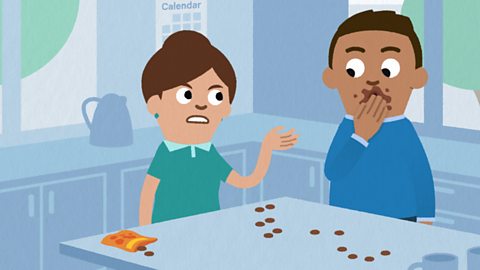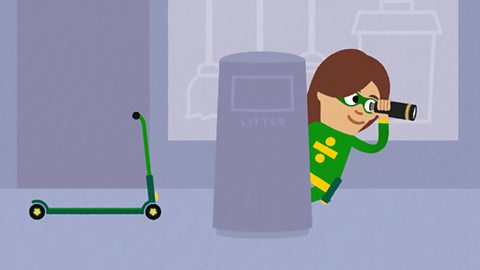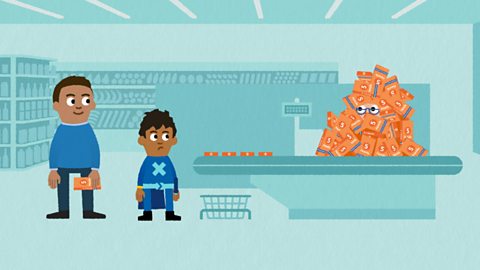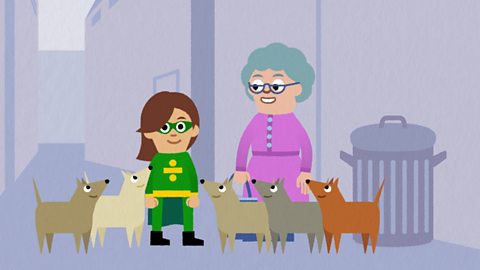Voiceover:
In a world without maths, a land where people forgot, who will save the day?
Baz:
Alright if I make some tea Dave?
Dave:
Sure thing Baz, help yourself.
Kitten:
Miaow
Baz:
Ooo hello
Kitten:
Miaowow
Baz:
And another.
Kitten:
Miaow
Baz:
Ooo cheeky, hehe.
Kitten:
Miaow!
Baz:
Ooooo!
Baz:
Dave, this is getting silly. You’ve got to do something about all these kittens.
Kitten:
Miaow
Dave:
What kittens?
Kitten:
Miaow
Dave:
Yeah I know Baz, I started trying to sort them out. You, Charlie, Mrs Barker and Sally, all said you’d take some.So I got 4 boxes and wrote your names on them, but then I got stuck.I was trying to share them out equally, but I wasn’t sure how many to put in each box.
Baz:
Errr that’s a tough one.Don’t worry I know someone who can help. Scoop all them kittens up, I’ll call…Divider Girl!
Kitten:
Miaow
Narrator:
Divider Girl can you help Dave and his brother Baz solve their problem?There are eight kittens that need to be shared equally between four people.Oh yeah, dividing time.
Eight divided by four.
Let’s start by sharing out the first four, that’s one kitten for each person and four kittens left to share. If everyone gets another kitten that makes two for each person with zero kittens left to share out.Eight divided by four equals two. Good work Divider Girl.
Baz:
Great, sorted, nice one.
Dave:
I’ll call Sally.
Dave:
Alright Sally, how’s it going?
(offscreen) Sally:
Alright Dave.
Dave:
We’ve just sorted out the kittens. There’s two for you, you can pick them up anytime.
(offscreen) Sally:
Kittens Dave?
Oh no, I thought you said mittens, cute, fluffy mittens. I can’t take any kittens, I’m allergic. Sorry.
Dave:
Oh, okay. No worries Sal.Now only three people want kittens.
Baz:
That’s okay Dave, we just need to share these two kittens equally between the other three boxes.
Kitten:
Miaow, miaow!
Dave:
Nice try Baz, but I don’t think that’s going to work.
Baz:
Hang on, Mrs Barker’s got all them dogs hasn’t she? I don’t think she’s going to be able to take kittens as well.
Dave:
Cats and dogs get on Baz.
Baz:
No they don’t Dave.
Dave:
Oh great, so we’ve still got loads of kittens and now only two people want them. Let’s go back a step, pop those ones back.
Kitten:
Miaow
Dave:
Right then, we’ve got one, two, three, four boxes with two kittens in each. How many have we got altogether?
Baz:
I don’t know Dave, I can’t count them, they keep moving around.
Dave:
Four lots of two that’s err, four times two that’s ummm, that’s errr…
Baz:
That’s multiplication Dave.
Dave:
You’re right Baz, that is multiplication. And I know just who we need for that.
Narrator:
Oh what’s this? I think Divider Girl’s got an idea. Ah yes, multiplication is the inverse of division.
Since we know eight divided by four equals two, we also know four times two equals eight.
Dave:
Of course, eight! That’s the number we started with, eight kittens.
Narrator:
Ooo she’s beaten Multiplication Boy to it, he’s not going to like that.
Baz:
Oh sorry Multiplication Boy, I think we’ve sort of done it.
Dave:
Right then Divider girl, you’re up again.We’ve got eight kittens but we want to share them equally between two people this time.
Narrator:
So you need to work out eight divided by two. Remember division is just…Everything alright Multiplication Boy?
Yes, four times two equals eight, we’ve done that bit already, keep up Multiplication Boy. Oh, you want to swap the four and the two over?
Well yes you can do that, Multiplication is commutativeso you can swap the numbers over, either side of the multiplication symbol and the answer is the same.So since we know four times two equals eight, we also know two times four equals eight.
Or in other words, we know four lots of two are eight, so we also know two lots of four are eight. Since division is the inverse of multiplication that means eight divided by two equals four.
He’s done it! Two people get four kittens each.Sorry Divider Girl he’s beaten you to it.
Dave:
Wow that’s impressive, Can you do that with division?
Narrator:
No division is not commutative.Eight divided by two equals four but two divided by eight does not equal four.Woo hoo hoo hoo, I love kittens! A woo hoo hoo ha, a woo hoo hoo, woohoohoohoo!
Video summary
Baz and Dave need to share out some kittens ready to go to their new homes!
At first it seems simple, eight kittens shared between four friends.
Things quickly get more complicated when they discover Sally is allergic to cats.
She can’t take any kittens, and Mrs Barker has all those dogs.
There are remainders involved, new calculations to solve and the inverse to be explored.
This sounds like a job for Divider Girl and Multiplication Boy!
The superheroes of A World Without Maths show Baz and Dave that they both have the skills to help solve this problem.
But who will be the first to get to the bottom of it? Will they manage to find new homes for all those cute fluffy kittens? And will Baz ever get that cup of tea he was after?
This clip is from the series A World Without Maths.
Teacher Notes
Key Stage 1:
You could present your class with the same problems as the story and give them toys and boxes or sorting hoops to act out the problem.
They might use an existing array to talk about how many dots are in each row, how many rows there are and how many dots there are in total.
They might write the related multiplication and division sentences for the array.
Pupils could use objects or drawings to create their own arrays to show the relationship between multiplication and division.
You could create number trios (placing three numbers on the corners of an equilateral triangle) to explore how these show related calculations in multiplication and division. For example, 4 and 7 at the bottom and 28 at the top show that 4 x 7 = 28, 7 x 4 = 28 and that 28 √∑ 4 = 7 and 28 √∑ 7 = 4.
Key Stage 2:
You could get your class to use drawings to create their own arrays to show the relationship between multiplication and division.
They could then write out all four calculations that the array shows.
Children might solve word problems that present multiplication or division problems. For example: Baz and Dave are going to share out all the cat food they have. They have 24 tins and each box can hold 4 tins. How many boxes will they need?
Or, Baz and Dave have some left over cat food to give away to the friends who are taking the kittens. They have 6 boxes. In each box are 4 tins. How many tins do they have in altogether?
This clip will be relevant for teaching Maths at KS1 and KS2 in England and Wales, and First and Second Level in Scotland.
How to use mental methods to multiply. video
Mr and Mrs Sharma can’t work out how many sausages to buy for a party, so they try to count using chocolate buttons, but are getting into a right mess!

Multiples of two, five and ten. video
Multiplication Boy and Divider Girl keep their maths superpowers sharp with a competition to count in twos, fives and tens.

How to use arrays to multiply. video
Multiplication Boy helps Mr Sharma buy pencils for the school, using arrays to multiply.

What is multiplication? video
Multiplication Boy uses repeated addition to help Dave work out how many bricks he needs to build a new wall for Mrs Sharma.

Dividing using repeated subtraction. video
Divider Girl uses repeated subtraction to help Mrs Barker with a division problem involving some hungry pups.

How to use mental methods to divide. video
Divider Girl helps Charlie with a division problem, using her multiplication facts.
